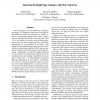Free Online Productivity Tools
i2Speak
i2Symbol
i2OCR
iTex2Img
iWeb2Print
iWeb2Shot
i2Type
iPdf2Split
iPdf2Merge
i2Bopomofo
i2Arabic
i2Style
i2Image
i2PDF
iLatex2Rtf
Sci2ools
97
Voted
NSDI
2008
2008
Detecting In-Flight Page Changes with Web Tripwires
While web pages sent over HTTP have no integrity guarantees, it is commonly assumed that such pages are not modified in transit. In this paper, we provide evidence of surprisingly widespread and diverse changes made to web pages between the server and client. Over 1% of web clients in our study received altered pages, and we show that these changes often have undesirable consequences for web publishers or end users. Such changes include popup blocking scripts inserted by client software, advertisements injected by ISPs, and even malicious code likely inserted by malware using ARP poisoning. Additionally, we find that changes introduced by client software can inadvertently cause harm, such as introducing cross-site scripting vulnerabilities into most pages a client visits. To help publishers understand and react appropriately to such changes, we introduce web tripwires--client-side JavaScript code that can detect most in-flight modifications to a web page. We discuss several web tripwi...
Related Content
| Added | 02 Oct 2010 |
| Updated | 02 Oct 2010 |
| Type | Conference |
| Year | 2008 |
| Where | NSDI |
| Authors | Charles Reis, Steven D. Gribble, Tadayoshi Kohno, Nicholas C. Weaver |
Comments (0)

